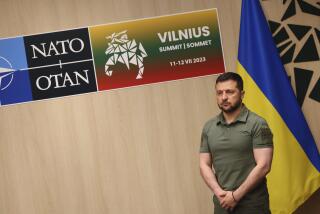A NATO Problem, Not a German One : * Why Secretary of State Baker Is Right to Favor Talks With the Warsaw Pact
- Share via
Moscow has suggested to Washington that the Warsaw Pact and NATO negotiate an agreement on nonaggression and mutual cooperation. Secretary of State Baker is reportedly warm to the idea but other NATO members are cool. They apparently regard the Warsaw Pact almost as moribund a body as Generalissimo Francisco Franco, and feel there’s little point to negotiating with a political corpse.
Baker has the better instincts. This kind of negotiation could help NATO shape its future role in Europe and help Mikhail Gorbachev accept the so-far unpalatable idea of a united Germany belonging to a Western-dominated alliance.
No doubt our NATO allies are not far wrong in saying that there may be more life these days in downtown Tirana, Albania, than in the Warsaw Pact. Arguably the West has won the Cold War, but for reasons of tact it’s better off not to insist on showing off the championship ring. Besides, the Eastern Bloc is giving up the fight. A remarkable Warsaw Pact statement in Moscow on Thursday threw in the ideological towel and hit a positively internationalist note of nolo contendere. Now this 35-year-old war horse has got to figure out what its role, if any, in the new Europe will be.
NATO needs to invest in some comparable introspection. The victor’s destiny is not always any plainer than that of the vanquished. NATO needs a new job description.
A conference with the seven-member Warsaw Pact might help NATO as much as countries like Hungary and Poland, which are eager to reach out economically to the West. NATO is suddenly in search of a mission. Its military usefulness is on the wane but it may have a political future. Gorbachev says he has no problem with a united Germany, but has troubles with the idea of a NATO that includes a united Germany.
How could the idea of a united Germany inside the North Atlantic Treaty Organization appeal to a country with bitter memories of the German invasion in World War II that sent 27 million Soviet citizens to their graves? Such memories die hard. But it’s increasingly difficult to figure out where else to park the new Germany.
Thus the central political problem between the two superpowers is really a NATO problem, not a Germany problem. A security conference between the Warsaw Pact and NATO might produce a transformed NATO or some other organizational vehicle of pan-European security that will enable Gorbachev and his countrymen to swallow bitter medicine without feeling they are being poisoned.
More to Read
Get the L.A. Times Politics newsletter
Deeply reported insights into legislation, politics and policy from Sacramento, Washington and beyond. In your inbox twice per week.
You may occasionally receive promotional content from the Los Angeles Times.








